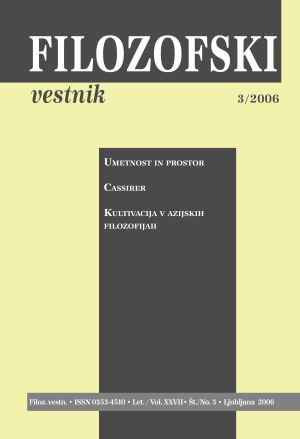Po sledeh novokantovstva in njegovih predhodnikov
Ključne besede:
Cassirer, Natorp, Cohen, Helmholtz, filozofija znanosti, teorija znanosti, novokantovstvoPovzetek
Sodobna teorija znanosti pogosto velja za nezdružljivo s tradicijo pretežno kontinentalne filozofije. Vendar pa je v kontinentalni Evropi obstajala neka filozofska smer, ki je nastala iz tradicije kantovske filozofije in je hkrati uspela ohraniti stik z moderno znanostjo in matematiko. Žal je po drugi svetovni vojni ta filozofija novokantovstva skupaj s filozofijo Ernsta Cassirerja v evropi dolgo veljala za preseženo. V zadnjih desetih letih smo vendarle priča naraščajočemu zanimanju za to filozofijo. Izhaja čedalje več knjig o novokantovstvu in zlasti o Cassirerju. Njegova Filozofija simbolnih form ostaja v središču pozornosti mnogih njegovih interpretov. Vendar si tudi nekatera njegova druga dela zaslužijo vsaj enako pozornost, zlasti Substanca in funkcija, K Einsteinovi teoriji relativnosti in iz nje izhajajoča diskusija z Moritzem Schlickom o učinku te znanstvene teorije na filozofijo. V svojem članku sem poskušal predstaviti razvoj te filozofije že od Helmholtza dalje in opisati nekatere osnovne probleme.Prenosi
Podatki o prenosih še niso na voljo.
Prenosi
Objavljeno
2016-03-05
Kako citirati
Šenk, J. (2016). Po sledeh novokantovstva in njegovih predhodnikov. Filozofski Vestnik, 27(3). Pridobljeno od https://ojs.zrc-sazu.si/filozofski-vestnik/article/view/4379
Številka
Rubrike
Cassirer
Licenca
Avtorji jamčijo, da je delo njihova avtorska stvaritev, da v njem niso kršene avtorske pravice tretjih oseb ali kake druge pravice. V primeru zahtevkov tretjih oseb se avtorji zavezujejo, da bodo varovali interese založnika ter da bodo povrnili morebitno škodo.
Podrobneje v rubriki: Prispevki





